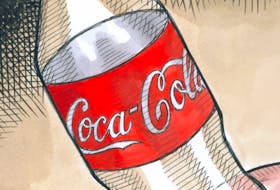It is near the end of the month. I am pondering whether or not to fill up at the gas pump. IRAC will be giving the go ahead for changes in fuel prices by the end of the month. Will it go up or down or stay the same? This is the toss of the coin Islanders face at least twice a month.
Outrage boiled over earlier this month and IRAC was the target. To be sure some of the criticism was legitimate such as the commission board being political appointees with it seems life time terms; the salaries of some senior management; the perception that Big Oil fuel providers have sway over prices; and the lack of understandable transparency which the auditor general found lacking.
I grabbed my pen to join the outrage. This by the way in the face of dismissive comments such as “there are bigger picture issues”.
Hmmm, perhaps so, but here's the thing: When someone earning minimum wages goes to the gas pump because they need their own vehicle to drive to work and forks over $30-$40 it might mean eating Kraft dinner the rest of the week. When the furnace oil tank nears being empty what should the fixed income earner do, forgo paying their rent or keep warm?
Five provinces [P.E.I., N.S., Newfoundland & Labrador, N.B. and Quebec] have some form of regulation systems. The federal government, during the period 1974 – 1985, regulated fuel prices but in 1985 signed the Western Accord with Alberta, Saskatchewan, and B.C. getting rid of that responsibility. Today Canada is “committed to a market-based approach”. As well the federal government does not now have jurisdiction over regulating fuel prices “except in national emergencies” but the provinces and territories do or so says the federal government website.
The purpose of regulating fuel prices is “reduce price volatility and to protect small independent retailers,” says IRAC. In fact, P.E.I. may have been a leader in establishing regulating fuel prices. These systems use formulas that include some or all of several factors such as transporting costs of fuel, oil “bench marks”, wholesale and retail margins and taxes added on by governments.
P.E.I.'s IRAC believe it has allowed fuel prices here to “remain stable”.
However, according to the federal government website, “evidence suggests that while keeping prices more stable it does not lead to lower prices for consumers.” Why did we consumers think it would?
Something else to consider is that there are now fewer independent retailers on P.E.I. and perhaps elsewhere with a greater number of fuel service stations owned by corporate fuel providers. This begs the question of who really is being protected by regulation of fuel prices?
My conclusions are that regulation will never truly make for affordable fuel prices; that Big Oil benefit the most; that there is a need for other ways to lessen the gap of income disparity, guaranteed annual income programs, affordable public housing and transportation to name a few solutions.
Now to toss that coin!
Edith Perry,
Millview









